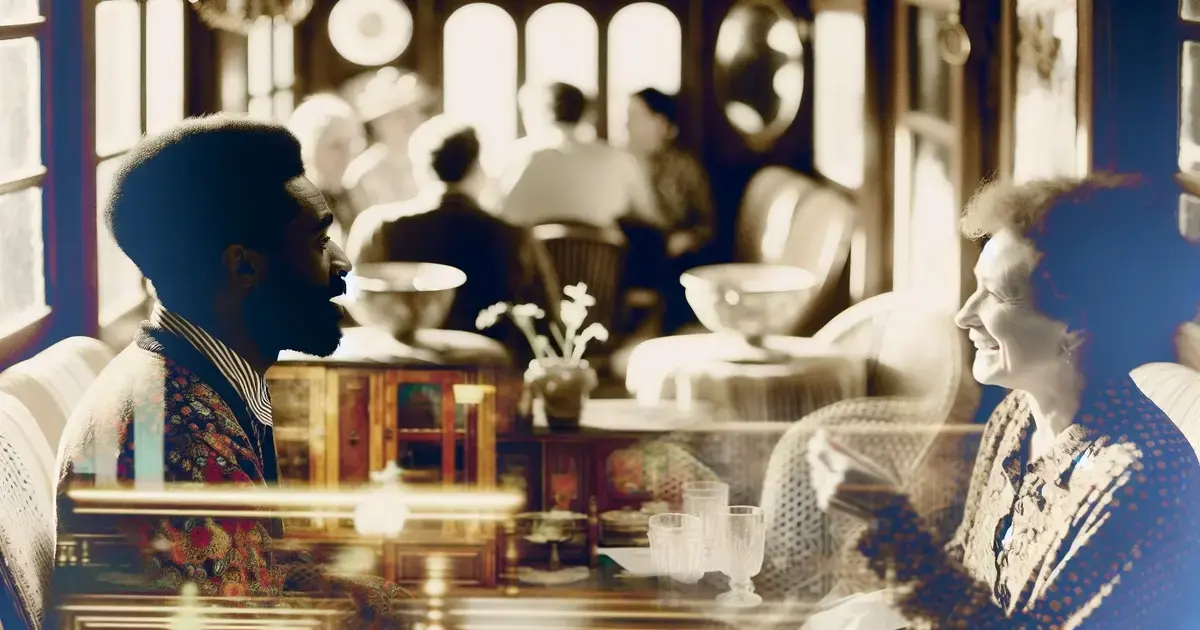Listen More, Talk Less: Strengthen Your Relationships
Discover the power of listening in relationships. Strengthen connections by learning to listen more and talk less. Start improving today.

Listening more and talking less might be the most essential advice on this list. In real life, those who listen more and talk less win the most trust and learn from those in their communities.
In Morocco, it’s polite to sit down and drink mint tea with someone and chat for an hour or two. They display authenticity by listening more and talking less. In busy Marrakech cafés or family homes, listening helps friends, family, and even strangers feel heard.
People find that slowing down and listening catch details and feelings they might miss if they talked more. The illustrated guide To101 People explains how this practice builds deeper connections and transforms everyday conversations into powerful exchanges.
" Listening more and talking less allows you to capture insights and knowledge that are hard to find when you’re always talking. "
Key Takeaways
- Listening more and talking less allows you to capture insights and knowledge that are hard to find when you’re always talking.
- Creating a culture of trust and respect in our personal and professional lives begins with listening to understand and respecting the views of those around us.
- Active listening, such as making eye contact, noticing body language, and paraphrasing what you hear, leads to more meaningful and engaging interactions.
- Simply limiting digital distractions and embracing comfortable silences can open the door to greater trust, empathy, and understanding within conversations in an increasingly distracted, fast-paced world.
- The impact of listening. Bringing this practice into your everyday life will help you settle disputes, increase understanding, and deepen connections with those around you.
- Measuring your talk-listen ratio is a simple but incredibly effective way to start. Test these new listening skills and enjoy a much deeper connection with others!

Why We Talk Too Much
Talking too much is natural and comes from many sources. Nervousness usually triggers it. When everyone in the room feels jittery, we might overcompensate by speaking more to break that stillness or uncomfortable energy.
Other times, the desire to show off, demonstrate knowledge, and play to the peer group is overwhelming. Whether in Moroccan cafés or crowded souks, people are excited to talk. They would give unsolicited advice when it would be in the way. Society incentivizes those who take a stand, often creating an impetus to continue talking.
Habits are a factor, as well. Learning to communicate in a home where nobody waited their turn to talk. It’s not hard to fall into that same mode in your discussions. Squirrel. Interruption soon becomes the norm.
That might feel excessive in an age where we’re all accustomed to taking phone calls and responding to text messages while in conversation. This diverts focus and renders genuine listening impossible. Our minds can jump forward, imagining future scenarios at nearly nine times the speed we can communicate.
Our brains operate at 900 wpm, but speech can only match at 400 wpm. Consequently, conversationalists often prepare their responses while the speaker is still speaking, which results in bad listening.
Most people do not genuinely listen to others. They tune out or miss the most critical points. They might talk over silence, perhaps becoming uncomfortable if an interval lasts too long. Listening is more than the age-old advice of not talking while someone else is talking.
It involves listening to the music and emotions within spoken language. When we listen poorly, we lose the opportunity, creating confusion or, at worst, inciting conflict. Deep listening fosters credibility, memory, and intercultural awareness, abilities we can all use in every nook and cranny of Marrakech, Morocco, and the world.
Related Tips
The Underrated Power of Listening
Accurate communication is built upon listening, the most underrated element of conversation. In Marrakech and beyond, the hum of the marketplace, the laughter in a riad courtyard, or a quiet moment over mint tea all reveal the deep value of hearing each other out. Far too many people think that good communication means good oratory.
The counterintuitive, magical, transforming power of listening sets every interaction's tone, direction, and even results. This installment takes a closer look at the underrated power of listening. Most importantly, it shows how listening enables policymakers to learn, build trust, earn respect, and make their words mean something.
1. Discover Insights You'd Miss
Listening lets you hear things that get missed when you are too quick to respond. In a busy medina, for example, a shopkeeper who listens to his customers learns what they want, what worries them, and what delights them. This isn’t simply about hearing the words being spoken—it’s about listening for the pauses, the tone of voice, the way something’s phrased.
You’re collecting much more information than what’s on the agenda by simply listening. Each conversation is an opportunity to discover something unexpected. You might find a new perspective or identify an unmet need.
Unfortunately, we’ve been conditioned to listen to our internal dialogue much more than what other people say, and lose sight of these precious nuggets. Listen—take the time to absorb what everyone else has to offer. This practice will help you see things from different angles.
This practice gives you a richer understanding to tap into when you reply. Respectfully and responsibly use what you learn to inform your creative process. Don’t be that person who talks over everyone and fails to engage! The phrase "two ears, one mouth" is a simple reminder: spend more time listening, and you'll catch more of what matters.
2. Build Stronger, Trusting Bonds
Genuine trust begins when people feel listened to. In Moroccan culture, sharing a meal – or a cup of mint tea – is often as much about listening as talking. When a person can feel that you are genuinely interested in what they are thinking and feeling, they drop their walls.
It is in this way that bonds become trusting and strong. Whether it’s a holiday dinner or a planning session, the power of the listener is paramount. Most importantly, they model the tone for honesty and openness, acting as a good conversationalist.
Building an environment where people feel comfortable raising critiques requires more than simply agreeing with everything. It involves active listening, clarifying questions, and affirming that what they’ve said matters.
With time, listening with intention builds trust and demonstrates that you appreciate the individual, not only the content of their communication. Consistent over dozens of talks, these moments are the connective tissue that builds trusting relationships.
3. Gain Respect Without Seeking It
Respect isn’t something you can command in a discussion. Instead, it expands organically as word spreads that you’re the type of person who listens intently. Studies have found that people who are attentive listeners are perceived as more trustworthy, empathetic, and likable.
By listening, you allow people to air their views; if you dare to listen, people will feel valued. You don’t have to deliver grand orations or command a spotlight to gain respect without seeking it.
After a while, your good name as a careful and respectful listener will precede you. Everyone wants to talk to someone who listens, as they understand their great ideas won’t hit a deaf ear. This long-term respect is exponentially more impactful than the temporary attention granted to whoever speaks first or loudest.
4. Make Your Words Truly Count
There is great power in making those words count through listening first. In almost any Moroccan setting, you’ll notice that when elders are present, people typically stop, think, and speak thoughtfully. Their words have real impact because they’re based on the deep listening that preceded them.
When you listen first and deeply, your words will have greater impact and importance. Speaking less doesn’t imply that you don’t have anything to say. That doesn’t mean it should be boring, though.
It means your words reflect that you’ve done your homework. That practice cultivates deeper dialogue, in which each individual contributes substance rather than static. Quality over quantity. Find ways to keep it short, because people will remember your truly thought-provoking points, not how many times you speak.
5. Sidestep Foot-in-Mouth Moments
Listening protects you from saying the wrong thing at the wrong time. Miscommunications easily occur when parties rush in too quickly, overlooking essential facts. By listening before you leap, you’ll better feel the mood and know if, when, or how to engage.
It’s an essential skill in complex, multicultural contexts such as Marrakech. Customs and expectations can be very different from one group to another. Being an attentive listener means you won’t experience the discomfort of repeating yourself or failing to hear what was just said.
This approach avoids embarrassment for you and your conversation partner, making the interaction more comfortable and enjoyable, ultimately fostering better interpersonal relationships.
6. Decode Unspoken Feelings
Communication is not just what we say but how we say it. People send nonverbal cues through body language, facial expressions, and silence. Eye contact, for example, can mean completely different things across cultures and contexts.
At times, it indicates sincerity, esteem, and, at other times, defiance. Oculesics, the study of eye contact, reveals the depth of our communication in silence. By learning to look for these signals, you can listen for unsaid feelings.
Silence can be equally deafening as a scream in high-stakes or emotionally charged discussions. Honing your ability to read these cues helps you be less insensitive to others and enriches your emotional intelligence and empathetic awareness.
7. Keep Conversations Flowing Smoothly
Active listening prevents conversations from reaching an impasse. Asking follow-up questions based on what you just listened to shows your interest. It demonstrates that you’re eager to learn and know more.
This call-and-response dance prevents any side of the exchange from being too contrived or disingenuous. Sometimes, pausing gives someone else the space to find their words, bringing out ideas that might otherwise stay hidden.
A skillful listener masters the rhythm. They are not heavy-handed or pushy, but do not let the ball drop. You will feel like each conversation is equal. It’s like taking a leisurely walk down a Marrakech souk—full of unexpected delights and collective experiences.
8. Become More Empathetic Daily
Genuine empathy can only heal with the strength of listening. You understand more when you listen to the words and the feelings behind them. This listening attitude allows you to experience the world through another’s lens.
This simple, daily listening practice cultivates deeper, more compassionate connections with each person you encounter. This is when listening evolves from a skill into something that transforms how you relate to and love your neighbor.
Over time, empathy grows, and even brief conversations can seem full of depth.

Master Simple Listening Techniques
The journey to becoming a good listener begins with simple, genuine steps. This one skill shifts the entire dynamic of how we relate to other people. It changes our perception of what our roles should be in a dialogue.
In Marrakech, where stories swirl in the stalls and souks, listening is an art that weaves hearts together. Local culture appreciates discussions conducted around a glass of mint tea or beneath the branches of an olive tree. With strings of silence, movement, and intention, stories are exchanged from mouth to mouth.
These moments show that listening is more than just hearing words—it’s about being present and open, even in the busiest settings. These techniques are uncomplicated but require consistent practice to get them ingrained so they’ll come naturally in daily life.
Focus entirely on the Speaker
Many people know the tale of the three wise monkeys: one covers the eyes, one the ears, and one the mouth, reminding us to see no evil, hear no evil, and speak no evil. Listening, including hearing, is much more than how things sound. That means focusing entirely and courteously.
The great American philosopher William James put it in bold relief, the “increased power of attention.” When you sit across from someone in a Marrakech café, with the hum of the city around you, try to focus on the speaker truly. Stow your phone, shut your laptop, and let your brain relax on their words.
Please make sure to maintain eye contact to reflect engagement. Showing that you’re concerned goes a long way in terms of engagement. In Morocco, eye contact indicates respect but should be friendly rather than piercing. Use active listening—nod, lean in, and insert little verbal encouragements that signal the speaker that you’re tuned in and following along.
Enter mindfulness—a powerful antidote to noise. So take a breath, pay attention to what’s happening around you, and release the tendency to space out or formulate a response. Multitasking divides your focus. When you multitask, research finds, you overlook important facts and pick up on the arc of a narrative.
Embrace Comfortable Silence
Comfortable silence is a natural part of Moroccan gatherings. Friends create an open expanse between words, allowing ideas to float in the air unhurried. However, many people are uncomfortable with these silent spaces.
Silence allows for deep reflection and authentic expression. Research has demonstrated that people tend to interrupt to fill the silence, thus losing the opportunity to listen for something more profound buried under the noise. Allowing silence to linger after asking a question or sharing a story can elicit deeper responses.
It provides the other person with space to collect their thoughts and allows both of you to pause and reflect. Silence becomes a comfortable, plush carpet spread between every word, softening the most difficult subjects to discuss. By resisting the urge to fill in the blanks too quickly, you convey faith and respect for the speaker’s cadence.
Ask Open-Ended Questions
Open-ended questions encourage storytelling rather than yes-or-no replies. In Marrakech, these usually start with "How did that make you feel…?" or "What was that experience like for you?" They encourage the listener to dig deeper than a simple yes or no, revealing the context and emotion.
Asking this question shows interest in getting to know the person and the information, if you don't mind. Instead of, “Did you like the market?” ask, “What was the most interesting thing you discovered in the souk today?” This simple question opens up a deeper discussion.
You can get into the habit of crafting queries that allow the respondent to elaborate. This type of questioning promotes flexibility and can make a basic conversation an inspiring dialogue.
Notice Body Language Clues
Not only are words just the tip of the communication iceberg. In Moroccan tea houses, even a slight angle of the head is loaded with meaning. A deliberate smile communicates more than an essay does. Excellent listeners pay attention to these body language cues.
Whether the speaker is calm, nervous, distracted, or eager, these clues can help you sense what someone is feeling when their words do not match what they are communicating. Align your body language with your verbal communication—palms out, slight nod.
This communicates that you are engaged and on the same wavelength. Recognizing these subtle indicators, in yourself and others, deepens your listening and prevents unintentional miscommunications.
Resist Planning Your Reply
It’s an easy trap to fall into, to mentally prepare your following argument while the other person is still speaking. This is a habit that keeps you from hearing what’s being said. Instead, see if you can hold off until they’re done speaking while you begin to formulate your response.
This patience allows you to absorb everything they say—all the words and emotion. The best response is occasionally a moment’s silence and an appreciative smile. You're open to ideas that might surprise you when you create space by slowing down and devoting your attention to listening.
In Morocco, an old proverb states: Listening is half of intelligence. It’s a skill developed by listening, not by planning your answer.
Briefly Paraphrase Their Points
To confirm your understanding, please briefly paraphrase their points. For example, you might say, “Did you get overwhelmed coming here for the first time?” or “You sound pleased about the new project!” This is a straightforward yet powerful step that helps to demonstrate that you’re paying attention.
It allows the speaker an opportunity to clarify or elaborate. Restating helps avoid misunderstandings and defensiveness. It makes both parties feel truly listened to, which is critical in cross-cultural discussions where each word might have more significance.
Related Tips
Listening Challenges in Modern Life
Modern life is pretty frenetic. Individuals living in Marrakech and elsewhere experience tangible hurdles when listening well. Screens, notifications, text messages, and busy streets compete for our attention.
Now, conversations can be more scattered—in short phone calls, voice messages, or even text. Combined, all these shifts make it increasingly difficult to attend to another person’s full presence truly.
Digital Distractions Steal Focus
Cutting through all this, phones and laptops are always within arm’s reach. They honk and hiss, distracting attention from children, parents, or pedestrians.
Studies have found that multitasking—even something as simple as checking a message—ruins the flow of great conversations. You’re telling a story to a friend, and they must stop halfway through because the phone goes off.
Putting easy rules in place, such as stowing devices during shared meals, makes a difference. Even digitally, turning off notifications or muting with “do not disturb” helps make presentations go more smoothly.
These tiny measures allow folks to listen more deeply, to hear every word truly.
The Pressure for Quick Replies
People assume they’re being pressured to respond within minutes. Whether in Morocco’s lively souks or bustling offices, faster responses have taken over.
The pressure to respond quickly can damage listening. Instead, most people react before the other party completes their statement.
Some begin crafting their replies before the chat even happens. Providing even more time—10 seconds, 15 seconds—allows creative ideas to percolate independently.
As a result, we’re having richer, more constructive conversations. Deliberate, respectful conversations take time but are essential for establishing trust.
Misinterpreting Tone Online
Misunderstanding tone on the internet can lead to significant issues. Online, words are stripped of their tone, and even a straightforward text message can appear frosty or brutal.
When you fail to clarify the tone, assumptions turn into emotional outrage. Throwing in emojis or little comments (“just sending this!”) goes a long way.
I want to ask for clarification to prevent discussions from getting derailed. Good face-to-face and virtual listening starts with pausing and asking questions before making assumptions.

Boost Your Career by Listening
Listening is more than just paying attention to what’s said. In the workplace, it fuels advancement and fosters confidence. When you listen well, everyone feels valued, and you engender trust and respect, resulting in greater loyalty and a more positive reputation among your fellow professionals.
This skill is valuable, especially in colorful and dynamic environments. In creative workspaces like those in Marrakech, diverse voices and viewpoints collide daily.
Lead Teams More Effectively
Listening deeply increases understanding and allows teams to collaborate more effectively. When leaders make it their job to listen to every team member, they send a message that all ideas are essential.
This approach builds trust and allows everyone to feel comfortable sharing, regardless of rank or tenure. By being aware of what each person contributes, leaders can identify the strengths and gaps within the group.
An attentive ear allows a leader to walk a fine line between facilitating frank discussions, maintaining morale within the ranks, and addressing issues before they fester.
Foster Better Collaboration
Empathic listening—the type that truly connects and engages—is the bridge to collaboration. Inviting various perspectives allows these diverse groups to discover unexpected common ground.
This method enables them to have tough conversations with poise and purpose. Teams that practice listening effectively with one another create an environment where ideas can flow.
This collaboration breeds new ideas and creative thinking and drives all parties to mutual objectives. This method helps teams stay flexible and innovative in Morocco's bustling work environment.
Shine in Meetings Silently
You don’t have to bloviate to make an impression. The ability to make a real impact lies in the power of the ear, to listen intently and select your words deliberately.
Meetings are much more productive when people don’t interrupt and talk over each other. Respectful silence provides room for others to think and ponder.
Easily doable practices—for example, repeating someone’s name and actively listening—demonstrate genuine engagement and help conversations remain speaker-focused.
Related Tips
Enhance Personal Relationships Now
Listening shapes how we connect with others daily, especially in close-knit circles like family and friends. When you listen twice as much as you speak, you foster trust and demonstrate respect for their input. In Marrakech, family ties are everything, and social life is filled with narrative.
You can add more depth to these uniquely beautiful experiences with attentive listening. Giving someone your full attention might mean putting your phone away or turning off the TV. This simple act helps you catch the small details, like a change in tone or a pause, that often tell more than words.
Connect Deeper with Family
Families flourish when every voice is valued and welcomed. Active listening—nodding, eye contact, allowing someone to finish speaking before you respond—demonstrates that you are genuinely invested in the relationship. Let’s say your sister opens up about her concerns about school.
Rather than leap in with your advice, you listen deeply and ask open, curious questions. Both of these practices deepen intimacy and help foster a safe container. Trust is built when families can discuss openly, starting with those low-risk conversations.
The home environment is more conducive to warmth, support, and connection. Listening is key to discovering the patterns of interactions with the family, such as who is often ignored at the dinner table or who typically talks over others. It leads to more productive conversations and less confusion.
Navigate Disagreements Better
When fights break out, taking the time to listen to one another can help weather the turbulence—you model respect when you allow the other person to explain their position without interrupting. Even when you don’t share their perspective, you can acknowledge it with a genuine, "I hear you."
More often than not, this collaborative process results in discovering common ground. It’s better than the alternative of pseudo-listening, where you seem to be paying attention and still completely miss the point. True listening, combined with empathy, helps us to identify solutions to challenges and connect divides.
Be the Friend People Trust
True friends hear, not just what is being said, but what is not being said. When you make time and give your friend your complete attention, they know they are essential. When a friend is grieving, just being with your friend, even without words, can be comforting and healing.
With practice, this way of being creates a bedrock level of trust. Your friendship will deepen when your friends know they can always count on you. In a time when the social distance feels like a chasm, sitting together as true listeners can bring us closer.

Start Listening More Today
Listening isn’t about just waiting for your turn to speak. This is a skill that becomes more powerful the more you practice. It is the most powerful determinant of our ability to interact with each other at home, work, and in our neighborhoods.
Developing improved listening practices requires intentionality and taking manageable, concrete actions at first. Amidst the lively souks of Marrakech, ideas are exchanged in colorful stalls and peaceful gardens. Your willingness to listen deeply will help transform all that clamor into deeper comprehension.
Notice Your Talk-Listen Ratio
To start, could you listen more than you talk? Notice your talk—listen ratio. For those who need not tolerate silence or express themselves, it is sometimes enough to ensure it goes the other way.
Research shows that people often think faster than they listen, sometimes leaving room for distraction. For example, in a crowded Moroccan café, you could find yourself dozing off while the host talks. What matters is becoming more present to these moments.
Track your habits for a day: Do you happen to interrupt? Notice how often you interrupt or don’t allow people to complete their thoughts. Changing your approach—allowing others to speak—can change your talk-listen ratio and result in deeper dialogue. After a while, you’ll notice a substantial improvement in how people treat you.
Practice One Technique Daily
I'd like you to practice one technique each day. For example, you could work on maintaining eye contact, giving an affirmative nod, or paraphrasing your understanding of what was said.
Nonverbal communication—such as tone of voice, posture, or a simple touch on the arm—is essential in Moroccan culture and may sometimes convey more than verbal communication. These little acts go a long way towards demonstrating that you’re trustworthy and care about what’s being said.
After each conversation, could you take a moment to reflect: Did you notice emotions behind the words? Were you hesitant to take the plunge? Listening becomes part of your routine by committing to one technique daily, not just a check off your list.
Conclusion
Sure, listening more and talking less sounds fine, but it flips the script on how people communicate in real life. Those who take the time to slow down and truly listen to others create trust quickly. So at play in the States, the top performers and best collaborators listen more than they talk. Back in the world, good friends and family demonstrate their love by listening more and talking less. You can communicate even in the noisiest environments, such as a crowded diner or a packed subway. Just a brief acknowledgment or a few words clarifies that you’re listening. Consider an invitation to take a moment before diving in with your narrative. Watch how people glow once they know you’re listening. Try it out—listen more, talk less, and see your universe expand.








